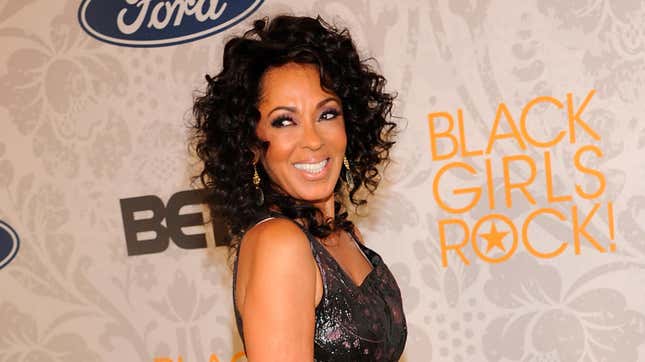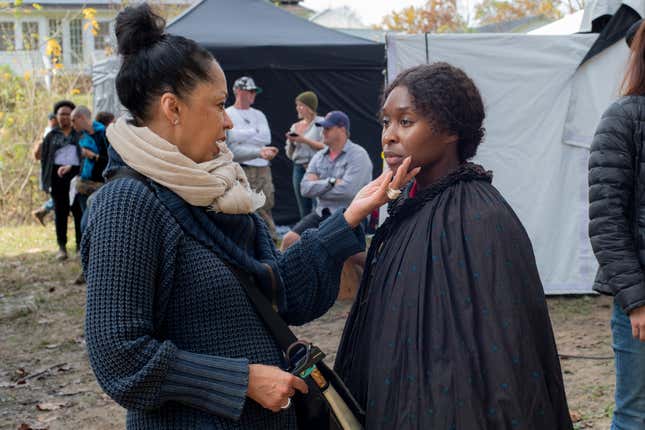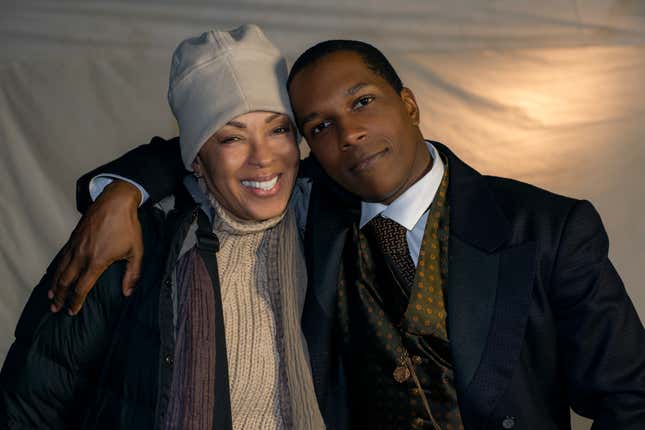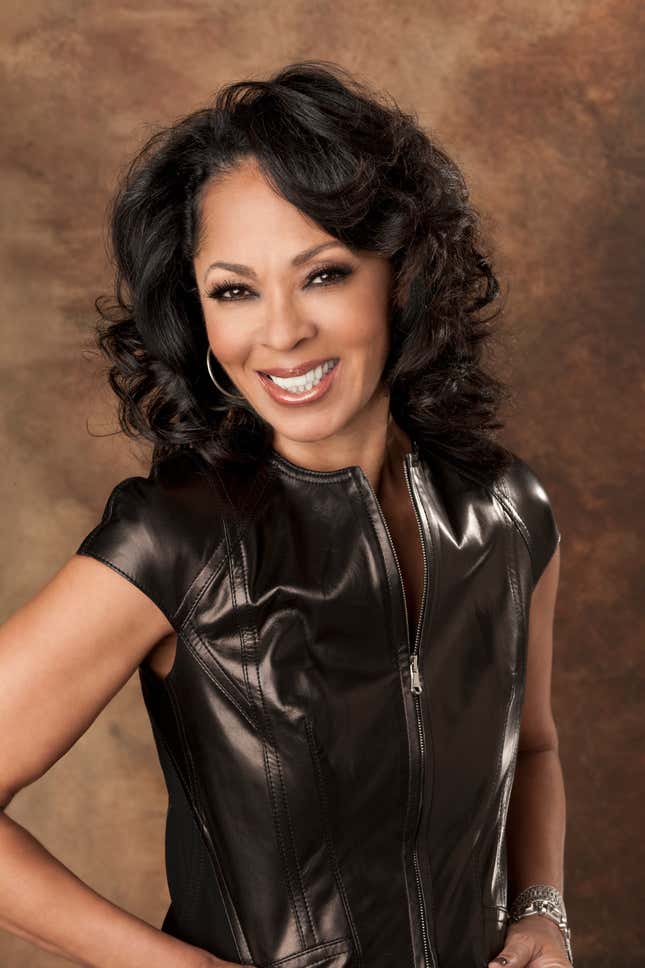
She’s the force behind some of America’s favorite films, including Sisterhood of the Traveling Pants, The Princess Diaries, the NAACP Image Award-winning Just Wright, the 2012 remake of Sparkle, holiday classic The Preacher’s Wife, and now, the highly anticipated biopic Harriet. Worldwide, her films have grossed over a half-billion dollars. But as producer Debra Martin Chase tells The Root, becoming the first African-American female producer to have a deal at a major studio—and the first to produce a film grossing over $100 million—was far from a direct path.
“I took the safe route and went to law school,” she shares, reflecting on her now-legendary career. “You know, as black women, we have to prepare ourselves to be twice as good and work twice as hard...I knew a law degree would be helpful in distinguishing myself, but my passion wasn’t there.”
Despite having all the trappings of success—degrees from Mount Holyoke and Harvard Law, a career at several major law firms and Fortune 500 companies, political influence (Chase worked on Michael Dukakis’ 1988 presidential campaign and was a superdelegate to the Democratic convention), and a high-powered marriage—Chase tells us “it just wasn’t satisfying.”
“I always felt like I had a contribution to make—to the world, to society—and I knew it wasn’t going to happen practicing law,” she says.
Divorce offered Chase an opportunity to reassess, and to reconsider her long-held desire to work in television and film—despite not knowing anyone in the business or how to break into it. The first step? Making the leap from the life she’d built in New York City into the great unknown of Hollywood.
“It was a big deal—like, I’m going to stop practicing law and give Hollywood a shot,” she says, recalling that at her going-away party, “people would whisper in my ear, ‘You’ll be back.’”
Chase would eventually come back—on her own terms, as the bicoastal head of Martin Chase Productions (which has a first-look deal at Universal Television). But while her previous successful career in law gave her the much-needed confidence to make that initial move, it also required a significant amount of humility, as she began to build a new career from scratch. With no experience or direct connections in entertainment, Chase drew on the contacts she’d made in the political arena and set about educating herself on the industry she longed to become a part of.
“Anybody who had anything to do with the entertainment business who would talk to me, I would go have a cup of coffee,” she recalls. “I read books, I went to seminars...I needed to get a basic understanding of how the business worked so that I could figure out what it was that I wanted to do.”

Chase’s big break came while in an executive development program at Columbia Pictures, where she forewent an income in order to learn the industry from the ground up.
“It was a risk,” she concedes. “I went off-path, but had it not worked out within a few years, I could always go back to practicing law, right?”
At a luncheon for the program, Chase was seated next to then-Chairman and CEO of Columbia, Frank Price. Impressed and amused by Chase, several months later, Price hired her as his executive assistant.
“That was kind of the fair-haired male job, traditionally,” she says. The position allowed her to witness how films get made, as she sat in on meetings, read scripts, and was personally mentored by Price, who she now calls one of “the last of the great, old-fashioned studio bosses.”
“He really was grooming me to part of his legacy,” she says, admitting that while as a former attorney it was humbling to be asked to fetch coffee and do administrative tasks, “it was like going to graduate school because I learned. I saw; I listened.”
Chase credits her own ability to advance to prioritizing her ambition over her ego. “I was really, really determined to get into the movie business, and I knew that this was an excellent opportunity. So, I just had to—within reason—suck it up and learn as much as possible so I could get onto the next level.
“You need to make a decision as to whether or not it’s more important to advance your program...to do what it takes—within reason, within your moral framework—to get where you need to go,” she later adds. “Or is protecting your ego, and protecting your pride, and protecting however you view where you’re supposed to be in the hierarchy of society. Is protecting that more important than advancing yourself?”
She also gives tried-and-true advice to those seeking a career in Hollywood: Learn your craft.
“I say that in general, because yes, there’s a lot of learning on the job, but it’s extremely competitive,” she says. “And in a lot of cases, you only get one shot. so when that opportunity comes, you need to be prepared to step through the door and take full advantage of it.”

Still, Chase admits that being a pioneer in Hollywood—she’s one of the first black women to produce a major studio motion picture—was a very real challenge. With a lack of role models or mentors who looked like her, she was charting new territory as a woman of color aspiring to become a Hollywood power broker. Instead, Chase found support in fellow outliers; unlikely success stories that helped her recognize and leverage her own potential.
“I started ten paces behind my white male counterparts,” she says, noting that the men she worked alongside had the luxury of worrying about money and securing major film scripts, assured that there was a place for them in Hollywood, if only they had the right property. “And I’m saying, how am I going to get in the position to make a movie, and to prove to the industry that somebody who looks like me can be a major player?”
“This is tough, and that was difficult because there was nobody to help me figure out how to play it,” she later adds.

Now Chase, who was awarded the Shot Caller Award at Black Girls Rock! this year is the role model and mentor she once so desperately needed. While a student at USC, Shonda Rhimes got her start in Hollywood as Chase’s intern; Chase would later hire her to write Princess Diaries 2 and The Hank Aaron Story. When asked ab0ut the significant shift the industry has undergone during her career—changes she in many ways helped create—Chase is both candid and pragmatic.
“It’s the best it’s ever been since I’ve been in this business,” she says. “Because Hollywood has finally recognized that there’s money to be made in diversity.”
“The paucity of opportunity fosters tremendous competition amongst black people in Hollywood,” she adds, reflecting on the scarcity of black roles, let alone black executives, when she began her career. Chase points to the increase in programs specifically aimed at cultivating diverse talent, the increasing amount of black leadership at major studios (on the day we spoke, Nicole Brown was announced as the new head of TriStar Pictures), and how challenging the casting process has become, since the top black talents are now constantly booked.
“We still have a long way to go, but there is so much more opportunity for everybody of color in Hollywood,” she says. “It has allowed people to change and now be supportive of each other in a big way, and that has helped everybody; it’s helped us be more powerful.”
That energy is echoed in Chase’s latest release, Harriet, the long-awaited Harriet Tubman biopic starring Cynthia Erivo, Leslie Odom and Janelle Monáe and directed and co-written by Kasi Lemmons. Its release on Friday, Nov. 1, is an especially proud moment for Chase, who tells us it took eight years to bring Tubman’s story to life.
“[It’s] about paying it forward,” Chase says, as we discuss Lemmons and the black female talent Chase continually tries to foster and grant opportunities, particularly at the directorial level. “That’s what it has to be about for us,” she adds. “Throughout my life, people helped me, and so I just have always felt an obligation to pay it forward.”
It’s a sentiment that seems particularly fitting as Chase brings the story of one of our greatest heroines in the movement for black liberation to the big screen. A pioneer in her own right, she is surprisingly humble about her still-growing legacy.
“In truth, the legacy is that I broke a lot of barriers. I’m a lot of firsts,” she says. “I had no idea that I would be a pioneer; I just wanted to make movies.”

